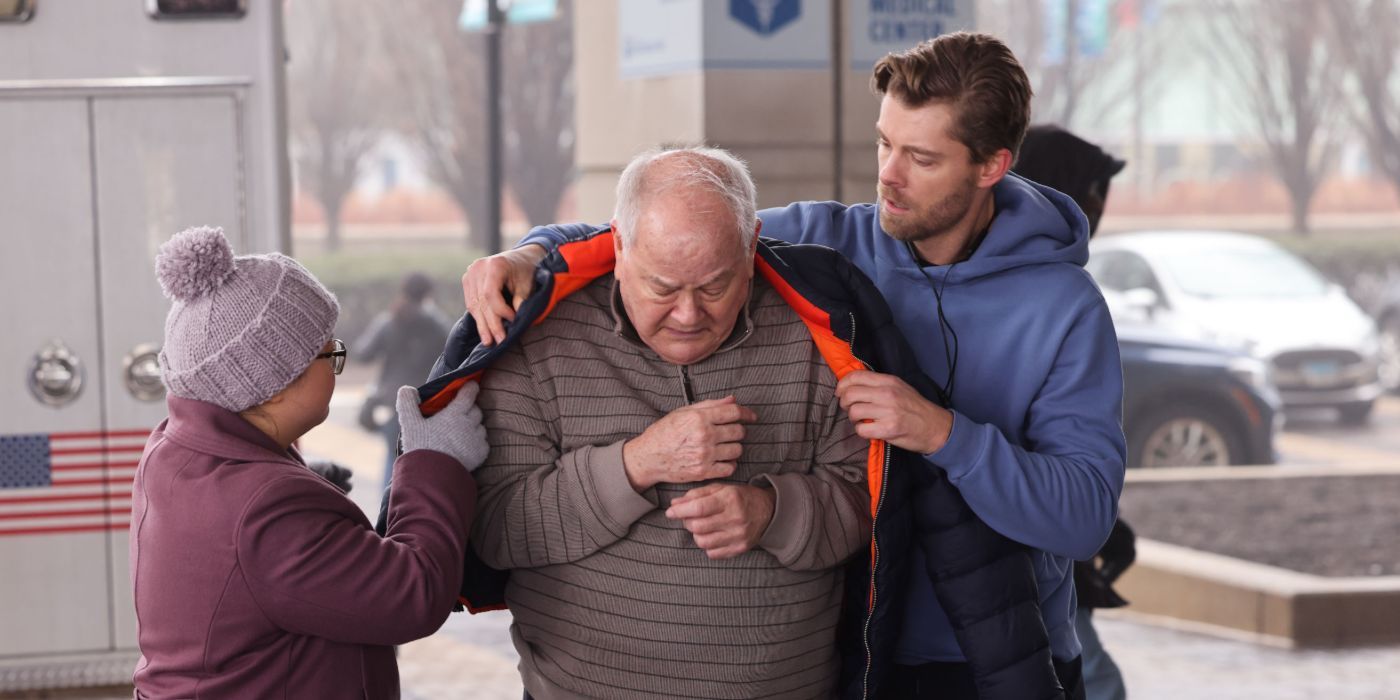
Fans of Chicago Med know that the titular hospital is deeply flawed. It’s struggled with funding and PR problems numerous times, and even by the standards of popular TV medical dramas, a large portion of the staff shouldn’t be working there. But what keeps audiences coming back is that despite all this, the characters are generally endearing. Season 9, Episode 5, “I Make a Promise, I Will Never Leave You” is a case study of that idea.
There are more apologies in this episode than the show has seen in a long time. Not all of the outcomes are warranted; there’s a few twists and turns clearly done for the usual dramatic effect. But this installment presents several characters in very human lights, instead of trying to make them TV heroes. It takes the time to flesh out its guest characters. And the end result is that for all of the things that go wrong, the viewer can’t help but appreciate the 42 minutes they spend at Chicago Med.
Chicago Med Pits Zola Against Big Pharma
The End Is Near for Dr. Ahmad

One of the common TV medical drama tropes is the idea of the small doctor fighting against the big institution for their patient, whether that institution is hospital bureaucracy or an outside force. The Grey’s Anatomy Season 20 finale is one of countless episodes to utilize the same concept, which Chicago Med has done more than once. During Season 9, Episode 5, it’s handed to Dr. Zola Ahmad — which is quite clearly the beginning of the end for her impulsive character. Zola sees a patient have an adverse reaction to a popular drug and pushes to have it pulled from the hospital’s rotation.
Dr. Zola Ahmad: Med data shows one out of 200. That’s 10 times what the manufacturer claims.
But since she’s already in hot water, audiences know that this conflict won’t go well for her. She doesn’t have any in-universe credibility to stand on. The viewers are aware that Zola is right. They’ve seen her patient react badly to the drug, and they’ve heard the statistics she’s presented to Dr. Crockett Marcel. Plus, in a medical drama, the hospital board usually chooses the thing that is worst for the doctors and/or patients. But that isn’t enough to sway feelings about Zola’s imminent battle with the system. She’s already been established as a loose cannon; if it’s not this, it’d be something else to end her career. The only real question is how her exit will inevitably affect Crockett, who’s been her one real ally.
Chicago Med has done quite a few short-term character arcs in its later seasons, introducing characters like Vanessa Taylor and Dylan Scott only to write them out before too long. “I Make a Promise, I Will Never Leave You” confirms that Zola Ahmad is another one of those. At least she’s going out with a solid plot that also has some relevance, and not getting a shock exit for dramatic purposes.
Dr. Mitch Ripley Has the Worst Day at Work
Chicago Med Gives Ripley a Heartbreaking Case

Chicago Med Season 9 has handed a much better prognosis to Dr. Mitch Ripley, who’s clearly not going anywhere. But “I Make a Promise, I Will Never Leave You” puts the screws to him in a different fashion: by going back to Ripley’s troubled backstory and his mental health issues. His case of the week pulls all that back out for Ripley — while also yanking roughly at the audience’s heartstrings. Between the plot itself and Luke Mitchell’s performance, this is one of the most wrenching stories Chicago Med has come up with in years.
Ripley is met outside the hospital by a hypothermic elderly man named Jimmy, who repeatedly asks the staff to “help Betty.” While Ripley and fan-favorite Dr. Daniel Charles try to figure out if Jimmy is suffering from mental illness as well as a physical problem, they also have to piece together Jimmy’s history. Once they (and the viewer) learn that Betty is Jimmy’s sister, it likewise becomes obvious that Betty isn’t going to be alive. That’s terribly sad on its own, but the truly shocking part is when Ripley gets his patient’s scans and realizes that Jimmy was lobotomized as a child.
Dr. Mitch Ripley: Dr. Sorenson stuck a skewer into his brain and… took care of that.
This development leaves the audience genuinely aghast. Between this and Dr. Hannah Asher’s case, Chicago Med tells two grim stories about doctors doing harm instead of good — making decisions that could be called inhumane. Ripley’s story is doubly intense, however, because once the truth comes out so do blindingly clear parallels to Ripley’s own past. He relives what he went through and then some, which Mitchell communicates with very little dialogue. When he watches a video about lobotomies, Mitchell’s silent expression makes clear that Ripley is horrified and crushed and once again struggling with his own trauma. And when Ripley has to turn Jimmy over to a social worker, Mitchell seems to be on the verge of tears. These extra elements in his performance, the choices that elevate what’s on the page and thus make the ideas effective, are why Mitchell has been such a valuable addition to Chicago Med.
The sole criticism of this subplot comes in what’s supposed to be the turning point between Ripley and Charles. While what happened to Jimmy is visibly dawning on Ripley, Charles is limited to a short response: “Awful.” But this is such a terrible reveal that one thinks he’d have more than one word to say. It’s not until much later that Charles actually reacts at length, and offers up an apology to Ripley for any perceived slight in the past. But by giving him basically a throwaway line in the moment, the script makes Charles seem hardly bothered.
How Chicago Med Makes Its Doctors Vulnerable
Season 9, Episode 5 Allows Them to Show Weakness
There are three other stories in Chicago Med Season 9, Episode 5, with the cases for Hannah and Dr. Dean Archer showing off the vulnerable sides of both characters. Hannah’s plotline is the episode’s most timely, as she treats a woman who suffered a miscarriage, but went into septic shock at a rural medical clinic because the doctor there wouldn’t perform the appropriate procedure. Chicago Med has done miscarriage plots before and all of them have been handled with incredible respect; this one is no exception. It’s written so the focus is not on Hannah but on Kaitlin and her husband Eric; Hannah is the facilitator of their story. She’s also allowed to be admirably honest.
Dr. Hannah Asher: I will do the best I can. But I don’t know.
“I Make a Promise, I Will Never Leave You” shows how far Hannah has come since Jessy Schram’s original exit from Chicago Med. Hannah originally was one of those short-term characters and bringing her back felt like a stretch, but a few seasons later she’s become a bedrock of the show. That’s a credit to both the writers and to Schram, who’s in great form here; she knows that the storyline isn’t about Hannah and she plays it in a beautifully understated way. The best scene in this plot is when Eric and Kaitlin are both apologizing to one another for vastly different reasons — Hannah is merely an affected observer.
Elsewhere, Steven Weber has another opportunity to remind viewers about Archer’s character development when he has to treat a young man from the rehab clinic where his son Sean has been working. The patient himself is basically a plot device, quickly and suddenly killed off near the episode’s end, because the actual story is about Sean’s faith in his father and his inability to deal with loss. He’s so assured that his father can save the patient — and Archer feels like he’s let his son down again, even though he knows he hasn’t. Like Hannah, Archer started as one very specific character and has flourished into so much more.
The subplots involving Sharon Goodwin and Maggie Lockwood are again forgettable, as they continue to focus on those characters’ personal lives with little that resonates; even Maggie signing her divorce papers feels like it’s just happening so she can hook up with Loren Johnson. Those moments of emphasizing too much relationship drama continue to be Chicago Med‘s weakness. Season 9, Episode 5 misses a massive opportunity to go back to Archer and Asher’s wonderful but neglected friendship by having them turn to each other; instead it’s Asher and Ripley who get the last scene together, because the show’s more interested in promoting them as a future couple. But aside from that, this is one of Chicago Med‘s finer episodes, and one of its most genuine.
Chicago Med airs Wednesdays at 8:00 p.m. on NBC.
